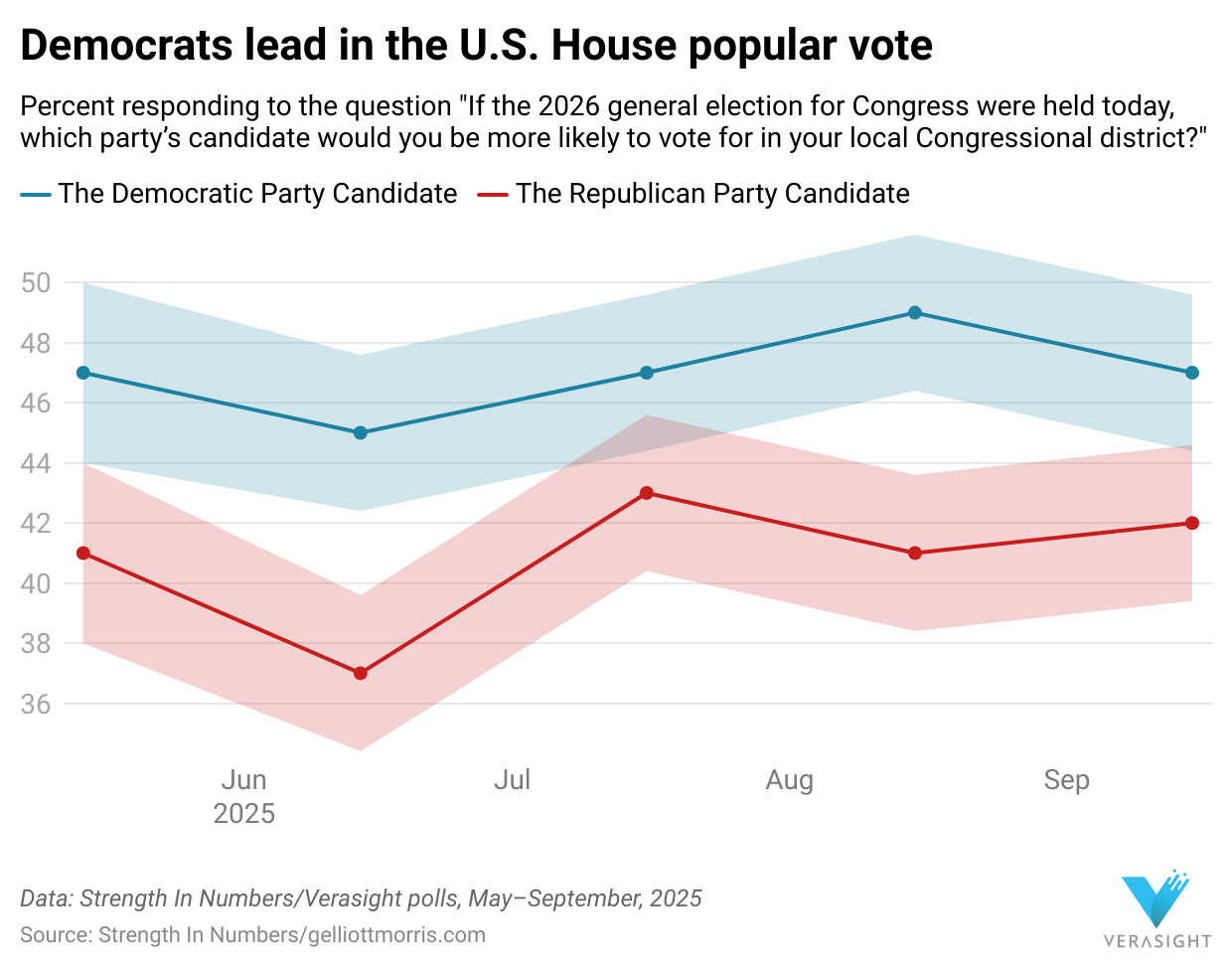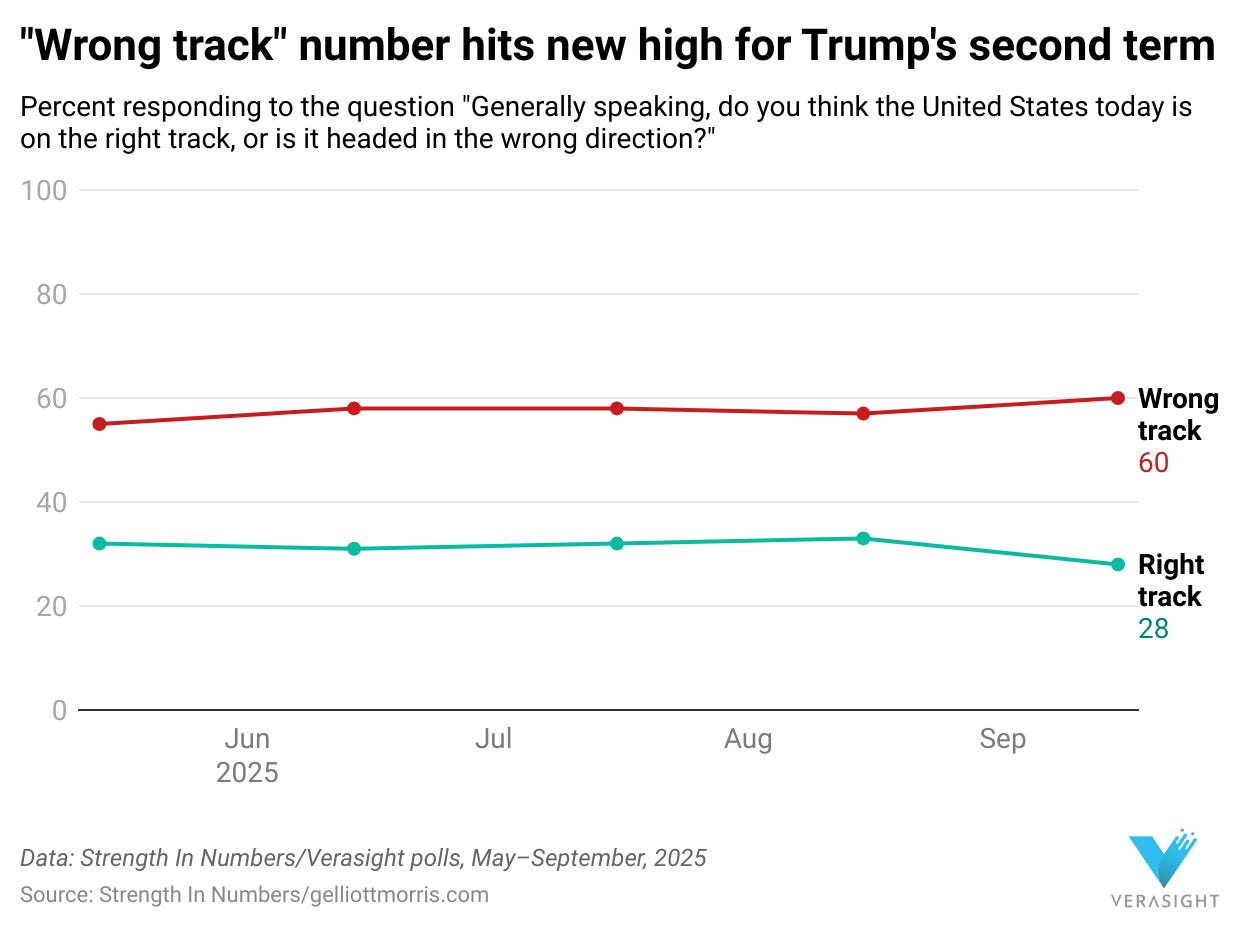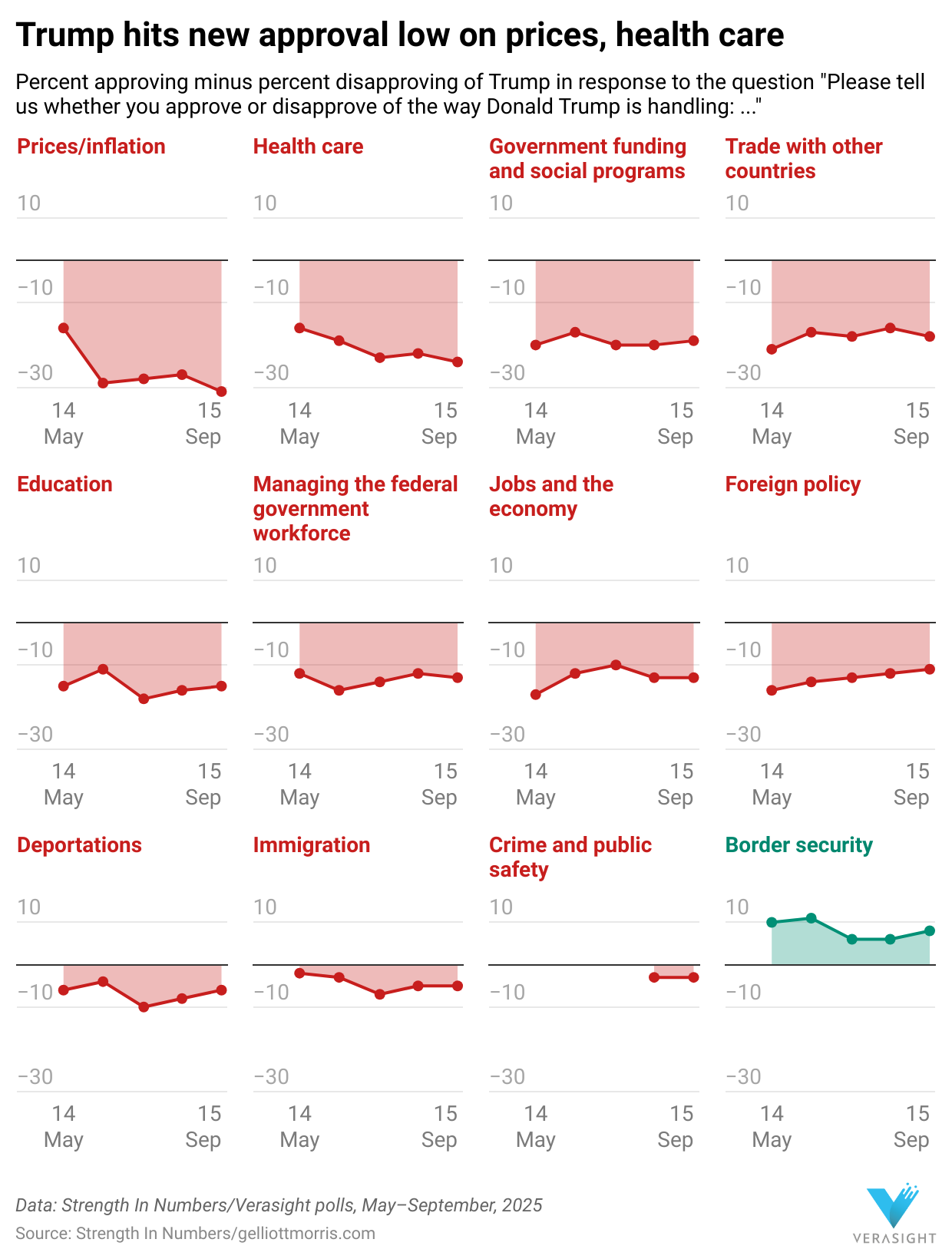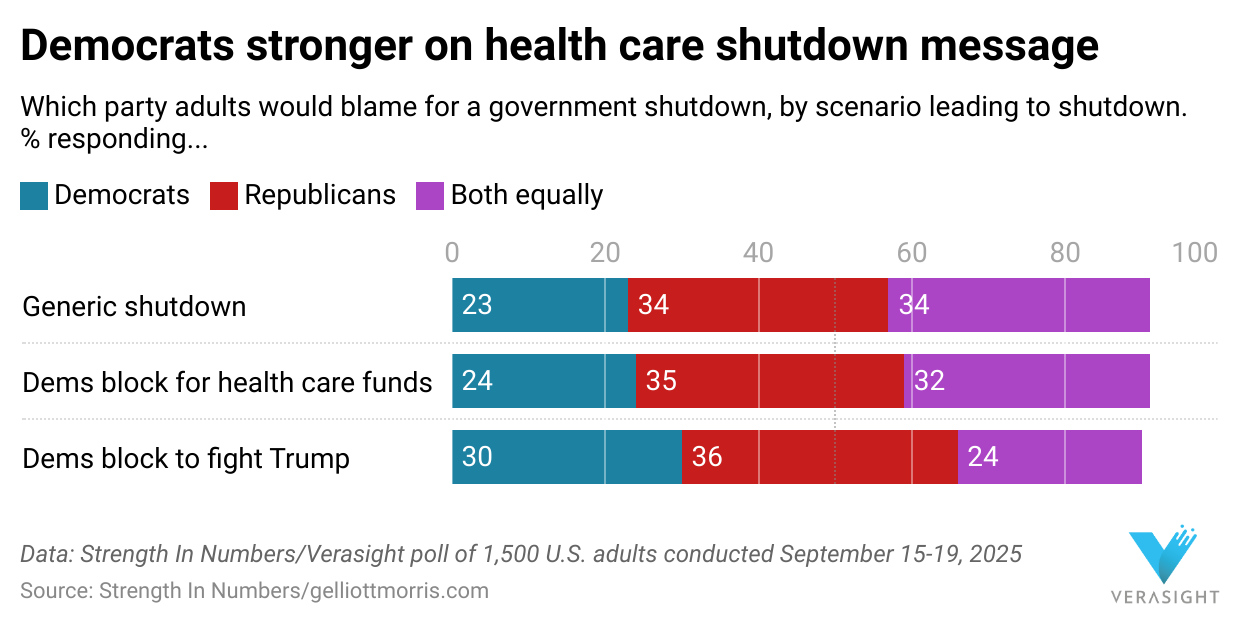New poll: Percent saying America on the "wrong track" hits new high
Plus: Democrats lead the U.S. House generic ballot by 5, Americans reject ICE racial profiling; and approval of Trump's handling of prices and health care hit a new low
This article reports results from the September Strength In Numbers/Verasight poll. You can read our previous poll releases here. Subscribers can suggest a question for the October poll here (or leave them in the comments).
Summary of main poll findings:
U.S. House generic ballot: Democrats lead 47% to 42% among U.S. adults (11% undecided). Among people who say they are definitely or very likely to vote, the margin is 50% to 45%.
Right vs. wrong track: Just 28% of U.S. adults say the country is on the right track, while 60% say it’s on the wrong track (12% don’t know). Pessimism is slightly higher than in August (33% vs. 57%).
Trump job approval: 42% approve / 55% disapprove (net -13). On specific issues, Trump remains underwater on most topics; he’s positive only on border security (52/44, net +8).
Immigration & civil liberties: 73% of adults say law enforcement should not be able to detain people based only on race, workplace, or language, as a recent Supreme Court ruling (temporarily) allows. Just 19% say those are sufficient factors, and that police should also need to provide a “probable cause” for believing someone is in the country illegally. Voters oppose Trump’s proposal to deploy National Guard troops to cities to assist in ICE enforcement operations 51–37.
The economy & tariffs: A 36% plurality says their personal finances are worse than a year ago. Trump’s policies are seen as making the economy worse (53%, versus 24% for “better”). His tariffs are unpopular (34% approve / 58% disapprove), and when forced to consider trade-offs, 54% say higher prices aren’t worth the alleged job protection (33% say they are). These patterns mirror August’s anti-tariff lean.
Government funding fight: If a federal shutdown occurs, 34% say they would blame Republicans / 23% Democrats / 34% both. In scenarios where Democrats withhold votes over health care funding, more voters still blame Republicans than Democrats. More on that below.
Methodology note: Verasight conducted this poll among 1,500 U.S. adult residents from September 15-19, 2025. It has a margin of sampling error of 2.6%. The survey was weighted to match the political and demographic characteristics of the U.S. adult population according to the U.S. Census Current Population Survey, as well as recent benchmarks for partisanship and past vote from official election results and the Pew Research Center.
Verasight uses mail, SMS text, and the internet to recruit a sample using hybrid sampling (both probability-based and non-probability techniques). To ensure independence of the research and editorial processes, Verasight handled recruitment, interviewing, and weighting the survey. Strength In Numbers conducts all analysis and editorial processes. SIN had input on questions, but did not participate in other methodological decisions.
You can download a PDF of the poll results, question wording, and a full methodology statement at the bottom of this page.
The generic ballot: a modest Democratic edge, slightly narrower than August
If the 2026 U.S. House elections were today, 47% of adults say they’d vote for the Democratic candidate in their congressional district, whereas 42% say they’d vote for Republicans (11% undecided) — a D+5 advantage. The margin is the same (5 points) among registered voters. That’s a touch smaller than last month’s D+8 (49–41) among adults, but within a zone of normal month-to-month variation.
This month, we added a question about how likely voters are to cast their ballot in next year’s elections. Among the most engaged voters (those saying they are definitely or very likely to vote), the margin is still D+5 (50–45). We also asked voters to rate their interest in the election on a scale from 1 to 10: Among the 10-out-of-10 voters, Democrats lead 55–41 (just 4% undecided) in the generic ballot. That mirrors the Democratic edge in recent special elections for Congress and state legislatures.
Among those rating their interest 6–9, Republicans inch ahead 48–46 (within the margin of error), while low-interest respondents have many undecided (roughly four in ten).
The national mood grows more pessimistic
The public remains deeply dissatisfied with the direction of the country. In our September survey, 28% of adults say the U.S. is “on the right track” compared to 60% who say it’s “off on the wrong track” (12% don’t know). That’s significantly more negative than August’s reading (33/57).
Persistent pessimism typically harms the party that holds national power — which, in a Trump-era environment, helps explain why the president’s issue ratings remain net negative and why Democrats keep a modest lead on the generic ballot.
Trump approval: still underwater overall, positive only on border security
The president’s overall job approval for September is 42% approve and 55% disapprove (net -13). (Note that our survey was conducted after Charlie Kirk was killed on Sept. 10.)
Looking issue-by-issue, Trump is net positive on just one dimension — border security (52 approve / 44 disapprove; net +8) — and closest to break-even on crime and public safety (-3) and immigration (-5). These are the issues he’s been best on since we started our tracking poll in March.
The president is most negative on the issues Americans rate as the most important: prices/inflation (-31), health care (-24), and government funding/social programs (-19). These evaluations largely mirror August’s pattern, with small, within-margin shifts.
Issue-by-issue ratings:
Of particular note is that this -31 reading for inflation represents an all-time low for Trump, as does his approval on health care:
These results underscore Trump’s enduring weakness on pocketbook — the policy domains that have decided the last several U.S. elections. Trump’s disadvantage on the issue goes a long way to explaining Democrats’ current lead on the generic ballot.
Now for a mixture of questions from me and the Strength In Numbers community. Our poll is supposed to be a collaborative, two-way project to make polling more transparent and more relevant for the average American. Subscribers to the newsletter are encouraged to submit questions via the comments, email, or submission form.
Immigration & civil liberties: strong opposition to profiling; skepticism of National Guard role
Pegged to a recent Supreme Court decision, we fielded a question about whether law enforcement (ICE) should be able to detain people on suspicion of being unauthorized immigrants based solely on factors like race, workplace, or language spoken. The public’s answer is unambiguous: 73% say no, and that officers should have to prove “reasonable suspicion” using additional criteria. Just 19% say those factors alone should be enough (8% don’t know). Civil-liberties frames on immigration enforcement appear to command broad, cross-partisan support.
Americans also reject using the Army National Guard to help identify and deport unauthorized immigrants: 51% oppose / 37% support (12% don’t know). This likely reflects broader public unease with blurring military roles in domestic policy; in our July poll, we also found the public opposed to Trump sending the National Guard and Marines to Los Angeles
The economy and tariffs: continued pain and continued skepticism
In our September poll, we repeated questions asked in August to assess any reaction to recent jobs and inflation reports, which have caused markets to spook and the Federal Reserve to drop its benchmark interest rate. Our September topline shows sustained economic strain and a steady, negative verdict on tariffs:
When asked about their personal finances, 36% say they are worse off than a year ago, 21% say “better,” and 40% “about the same.”
When asked how Trump’s policies have impacted the nation’s economy, 53% say worse and 24% better (18% “about the same,” 6% “don’t know/not sure”).
We also asked about general approval and a forced-choice question about tariffs, which the Supreme Court recently announced it would hear a constitutional challenge on in November:
Tariffs in general: 34% approve vs 58% disapprove (7% DK). In August, the split was 36/56 — so this month’s survey suggests a slight weakening of Trump’s position on his key global trade policy.
Prices vs “protecting jobs”: 54% say tariffs are not worth it if they raise prices; 33% say higher prices are worth it to protect American jobs/industries. The results were the same in our August poll.
Put together, these responses add color to the Trump issue approval data we also gathered. Even if some voters like the idea of “protecting American jobs,” they are much more responsive to the immediate cost of higher prices — a message that clearly resonates. Democrats, for their part, can credibly attack tariffs as a pocketbook tax while pairing that argument with an economic agenda focused on lowering costs and stabilizing services like health care (where Trump’s ratings are weakest).
Government funding fight: a plurality blames Republicans, but nobody wants a shutdown
Heading into a possible government shutdown on September 30, we asked our representative sample of U.S adults how they would prefer voters resolve the impasse and who they would blame if the government did, in fact, close:
A plurality of the public favors both parties passing a short-term continuing resolution to keep the government open (37%) while they debate other issues. If that’s not possible, fewer voters want a clean bill without changes (21%) vs withholding votes until funding is restored (26%).
If a shutdown happens, who gets the blame? 34% of adults say Republicans in Congress will be responsible for a shutdown, vs 23% Democrats in Congress, and 34% say “both equally.”
Currently, it looks like Democrats will withhold support for a government funding bill unless Republicans restore some of the health care funding (eg, Medicaid, ACA subsidies) that they rolled back in the July “One Big Beautiful Bill.” When asked if they support this, 52% of adults say yes (29% strongly), and 36% oppose (12% don’t know).
According to our poll, a small plurality of Americans would still blame Republicans for the shutdown even if Democrats are withholding votes for health care funds:
If Democrats vote against a funding bill after Republicans refuse to restore health care funding, more Americans still blame Republicans (35%) than Democrats (24%), with 32% blaming both. (These numbers are similar to the topline blame results.)
Others have proposed that Democrats withhold support for the funding bill on the grounds that Trump is an authoritarian. Blame for Democrats rises in this scenario:
If Democrats vote against a funding bill as a broader statement of opposition to Trump’s agenda (such as on immigration enforcement, deployment to cities), the split is 36% blame Republicans / 30% Democrats / 24% both.
Generally, the conventional wisdom that government shutdowns hurt the party in power or have a durable effect on public opinion is overstated. But if you’re going to shut down the government, it helps to tie the move to something you want to deliver for voters. Democrats start with a real, if tenuous, lead on the shutdown fight.
The other way to view this shutdown polling is that, if there is going to be a shutdown, Democrats should fight for health care funding since it doesn’t increase the percentage of Americans who say they’d blame the party for it. Put another way: If you’re going to get blamed by some people for shutting down the government anyway, you might as well use the opportunity to accomplish something.
That’s it for this month’s survey. You can download a full topline file and methodology statement using the link below:
For any questions, please email polling[AT]gelliottmorris.com.
Have a suggestion for next month’s poll? You know what to do!










Trump Ice agents killed a civilian. Now found FOR NO CAUSE! Trump DOJ lied and said fed agent was SERIOUSLY INJURED and dragged by the civilian’s car.
Nope local cop body cameras SHOW FACTS. ( ice agents ALWAYS WORE BODY CAMS UNTIL TRUMP BECAME LEADER)
The trump agents had MINOR INJURIES! Stated this over the radios!
They are killing humans for NO REASON Oh and the dead victim was LEGALLY HERE ON J-1 work visa as an agriculture worker!! Was in Chicago area to help at boss’s farmer market!
I say plural HUMANS because there is news SEVERAL 1000s of humans on American soil ARE MISSING after taken by trump agents!
https://chicago.suntimes.com/the-watchdogs/2025/09/22/ice-officer-injuries-nothing-major-deadly-franklin-park-shooting-mexican-immigrant-chicago-video
Be smart Dems, if shutdown is the road you choose, use healthcare as your message, not ANYTHING else!